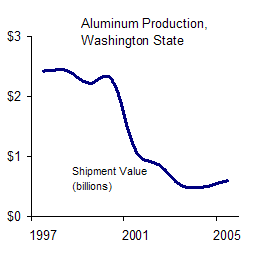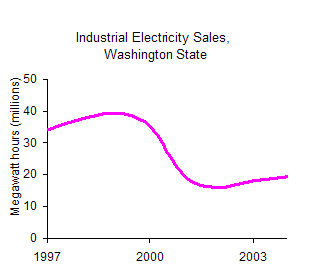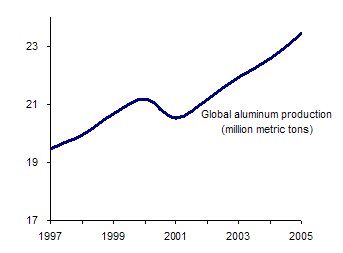The Northwest has seen a precipitous decline in its aluminum industry,* which was once responsible for roughly 4 percent of the region’s greenhouse gas emissions (and as much as 7 percent in Washington, where most of the smelters are located).
And the industry’s decline has been mirrored by a slide in industrial electricity sales because smelters are massive energy hogs.
A blow for workers, but a bonus for our region’s climate impact and a step towards a more sustainable economy… right?
Well, maybe not.
While the Northwest has been shifting its economy toward greener pastures, global aluminum production which emits greenhouse perfluorocarbons (PFC’s)–the most powerful and longest-lived greenhouse gas—is still on the rise.
Northwesterners still build Boeing jets, guzzle pop from cans, and construct aluminum-sided buildings. So we haven’t stopped using aluminum; we’re just buying it from farther away. In fact, apparent aluminum consumption grew about 1 percent in the US from 1997 to 2005, even while the Northwest’s 10 aluminum smelters went dark.
So the region has lost jobs. And while closing the smelters may have improved local environmental problems, we’ve likely made little global progress on emissions.
I don’t mean to get you down. Greening the local economy is vital; the transition should start here. But before we get too excited about our progress, we should remember the power of our consumption to drive environmentally harmful industries—even when we drive them elsewhere.
*Aluminum guru Eric de Place notes an irony: when the aluminum plants closed in 2001, the region actually reduced its greenhouse gas emissions. But the closures were brought on by a drought that was very similar to what scientists believe will happen in the Northwest as a result of climate change.











Alan Durning
Nice post, Deric.One other dimension to consider: When last I checked (ahem, for our 1995 book Hazardous Handouts) the Northwest’s smelters were less energy efficient than the international average, largely because they were older and smaller than the average. So it’s possible that outsourcing aluminum production may have saved a bit of energy, on net—though at a big cost in high-paying jobs for Northwesterners.Oh, and the newest Boeing jets—787s—are made with much less aluminum than the older ones. They’re bodies are made of carbon fiber. And even if they weren’t, I’d be pleased to see aluminum used in jets—which consume such huge amounts of energy over their lives. Light-weight aluminum in transport vehicles saves lots of energy, on net.The usage of aluminum that’s always seemed wasteful to me is in beverage cans.
Alan Durning
That would be “their bodies are made of carbon fibers.”
Dan
You guys done good in hiring Deric.The thing to remember is that these folks are just going to move elsewhere to purvey their externalities. This is not to say that WA didn’t do good, just that environmental justice needs always to be vigilant; these people will just pollute someone else’s air and take whatever energy subsidies they can pay someone to obtain.D
carol
Just today the NY Times published this article about aluminum smelting in Iceland: http://www.nytimes.com/2007/02/04/world/europe/04iceland.html?_r=1=sloginThank you for bringing up this important topic. Few people who I encounter understand the tremendous energy requirements associated with aluminum.